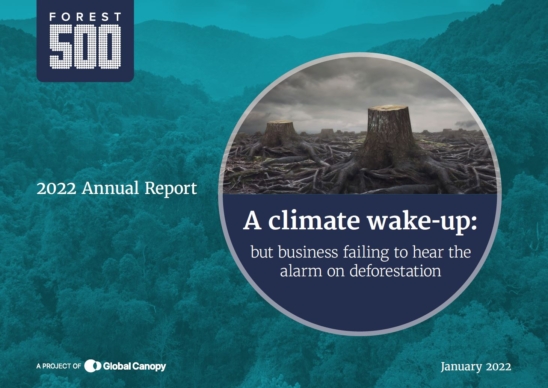OXFORD, England , January 13, 2022 (press release) –
Companies and financial institutions are undermining global climate goals by failing to tackle tropical deforestation, according to the latest annual Forest 500 report, published today.
‘A climate wake-up‘ finds that one third of the 350 companies with the greatest exposure to deforestation through palm oil, soy, beef, leather, timber and pulp and paper – do not have a commitment to remove deforestation from their supply chains.
And almost two thirds of the 150 financial institutions that provide the most finance to those companies do not have a deforestation policy, including the world’s three biggest asset managers, BlackRock, Vanguard and State Street.
The report warns that companies will be ill-prepared for changing regulations, with new laws in the UK and proposals in the European Union requiring companies to ensure that imported goods are not linked to deforestation.
One third of those companies that have deforestation commitments do not appear to monitor their suppliers or their own operations to ensure that supplies are actually deforestation-free.

“Last year saw unprecedented political action as more than 140 governments recognised the urgent need to protect forests, yet most companies and financial institutions with the greatest ability to halt deforestation are doing little or nothing. As major consumer governments start to translate these commitments into hard and fast legislation, businesses which have not taken deforestation seriously are woefully unprepared and face real risks.”
Global Canopy Executive Director Niki Mardas
Food companies are particularly exposed to deforestation risks, with palm oil a common ingredient in processed foods, and soy used widely in animal feed for pigs and poultry. Yet more than half of companies linked to soy do not have a commitment to ensure their soy supplies are deforestation-free.
With some $5.5 trillion in finance driving the deforestation economy, these banks and institutional investors could be playing an important role by encouraging companies to act on deforestation, but most are not using their leverage.
“The time to ratchet up our collective global ambition to deliver on the Paris Agreement is now. Halting agriculture-driven deforestation to halve emissions and reverse biodiversity loss by 2030 is not an option but a necessity for companies credibly committed to net zero in order to fulfill their science based commitments. There is no pathway to keep 1.5C within reach without that. Companies that interact with the food system across the value chain need to address deforestation to safeguard their future business and make a difference in protecting forests, and wildlife and the communities that depend on them, contributing to the system shift towards a nature-positive future.”
Nigel Topping, High Level Champion for Climate Action at COP26

The report urges companies and financial institutions to set and implement strong deforestation commitments and policies covering deforestation, conversion, and associated human rights abuses, with clear plans for implementation and transparency on progress made.
* All content is copyrighted by Industry Intelligence, or the original respective author or source. You may not recirculate, redistribute or publish the analysis and presentation included in the service without Industry Intelligence's prior written consent. Please review our terms of use.